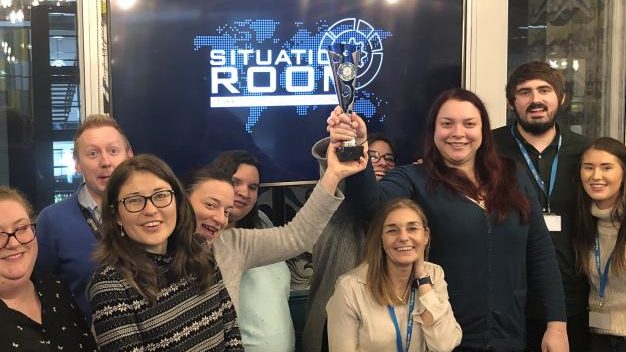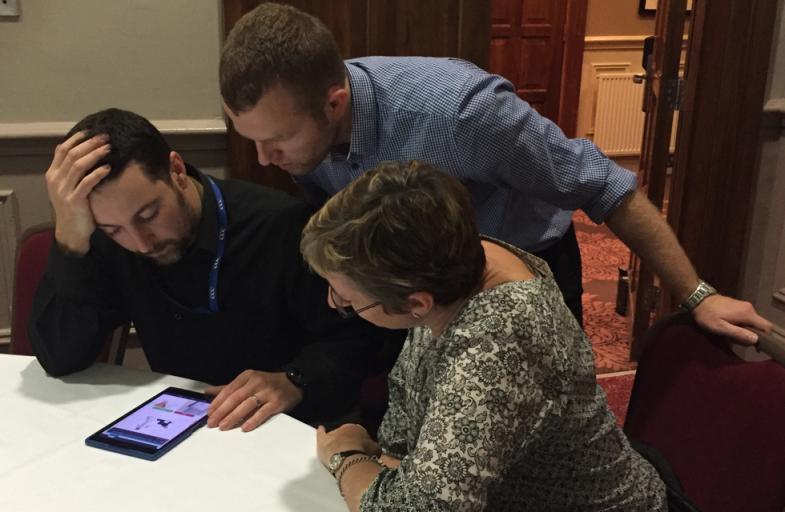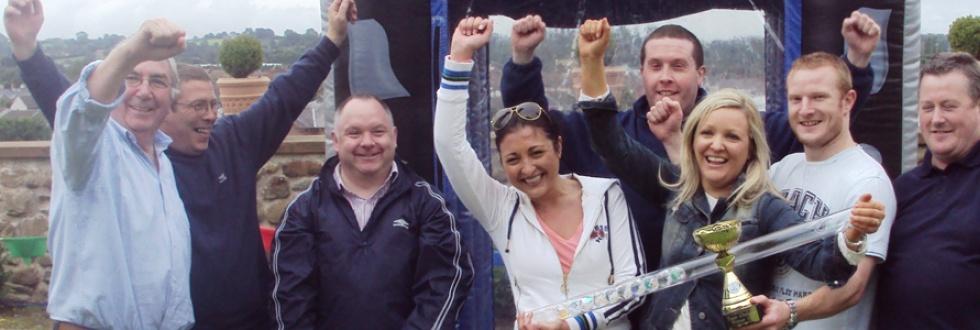info@teamchallenge-company.co.uk
03300 04 09 03
Jonathan Hazley, co-director of one of the UK's leading corporate team building businesses, Team Challenge Company, on why forming a choir creates the ultimate team.
After the years of lockdowns and restrictions with no major sport or music concerts, it has been an electrifying experience to stand in a stadium as they echo again with the sounds of the national anthem and sing out from the stands when stars turn over the microphone to allow us to carry the song.
The benefits of group singing are 'plentiful and scientifically proven' so says David Hill, musical director of The Bach Choir and principal conductor of Yale Schola Cantorum. According to Sarah Wilson, a clinical neuropsychologist and head of the School of Psychological Sciences at Melbourne University, large parts of our brain 'light up' when singing. The physical exertion alone can energise individuals and release endorphins and the breathing techniques are a known stress buster.

During the lockdowns the news channels broadcast Italians singing from their windows in a show of togetherness. One American nurse's rendition of Amazing Grace went viral after she sang for her colleagues during a shift change on a Covid ward. Famous popstars felt compelled to reach out virtually and connect with fans with stars from Coldplay's Chris Martin, Gary Barlow and Elton John all streaming live from their living rooms.
For many of us, we recognise the power of singing to make us feel good, and in a group, this is only amplified. In the last decade choir singing has no longer been confined to school halls and church pews. Pre-pandemic the rebirth in the popularity of choir singing was due in large part to the US hit TV show Glee and in the UK, the 'Gareth Malone effect'. The English Choirmaster's BAFTA award-winning BBC TV series 'Military Wives' led to a Christmas number one. Contemporary 'Rock Choir' groups sprang up across the UK, which required no auditions or musical knowledge and attracted members from accountants to firefighters. Having had such success with Miltary Wives, Gareth Malone went on to take singing into the workplace in 'Sing While You Work' with choirs featuring workplaces from Citi Bank to Sainsbury's.

The tenets of a good choir of listening, collaboration and cohesion have all the hallmarks of the ultimate team. Along with the well-known boost to wellbeing, a psychological study from Michael, Sebanz, & Knoblich in 2016 found that increased interaction and coordination was seen to enhance commitment to a common goal. In a choir, from the sopranos to the bass, everyone has a part to play, and when individual voices join to create a harmony the choir becomes greater than the sum of its parts. Like any great team, when working in harmony, they can achieve things that would not be possible alone.
After being separated and working remotely for more than a year, supporting teams to reconnect is at the forefront of our minds. For many companies to successfully navigate the year ahead their teams will need to be focused and energised.
The tenets of a good choir of listening, collaboration and cohesion have all the hallmarks of the ultimate team. Along with the well-known boost to wellbeing, a psychological study from Michael, Sebanz, & Knoblich in 2016 found that increased interaction and coordination was seen to enhance commitment to a common goal. In a choir, from the sopranos to the bass, everyone has a part to play, and when individual voices join to create a harmony the choir becomes greater than the sum of its parts. Like any great team, when working in harmony, they can achieve things that would not be possible alone.
After being separated and working remotely for more than a year, supporting teams to reconnect is at the forefront of our minds. For many companies to successfully navigate the year ahead their teams will need to be focused and energised.
E-choir has been cleverly constructed to circumnavigate the slight time lag online to allow remote workers anywhere in the world to have the experience of being in a choir. While many of us may restrict our singing to the shower, E-Choir is designed to be inclusive and allow everyone to feel relaxed and empowered to take part without fear of embarrassment. Participants stay on mute and can record their part individually, on their phone, Dictaphone or WhatsApp. No individual need ever be heard alone. In this non-threatening context, we have witnessed that even the most reserved are surprised by what they can achieve, going far beyond their perceived limitations. Those in a team who are keen singers and want to share can be selected and allowed to shine.

The shared moment of celebration comes post-event, where attendees are sent a final version of their song with all voices professionally mixed by skilled music producers. This final song, a powerful demonstration of unity, can be kept and replayed in future and the experience of singing together will create a talking point which will last far beyond the end of the event.
Find out more E-Choir here: tcc-old.quantumitdigital.com/services/remote-team-building/e-choir

Quizzes make a great form of evening entertainment and they are a versatile activity that can be readily adapted to suit different audiences. From classic and traditional questions to more unique quiz round ideas, there are plenty of options to choose from!
Here at Team Challenge Company, we are a team building company that is well aware of the importance of ensuring that quizzes are interesting, engaging, and valuable. The Big Quiz is our fun and competitive team quiz, expertly presented by our professional team to ensure you and your colleagues can make the most of the event.
However, just what exactly is it that makes a quiz stand out? What are the factors that will make your team’s quiz stand head and shoulders above the rest? We’re here to outline the key points and discuss the important components that go into making the best quizzes.

Nobody wants to get stuck with the same old quiz rounds over and over again, so it’s important to add some variety to your event with fun quiz rounds. We have a wide assortment of quiz round ideas to help you pick out some different options, ranging from new twists on classic rounds to entirely bespoke ideas that will help your quiz stand out from the rest!
Teams engaging in our Big Quiz team building activity will benefit from our extensive wealth of knowledge in the industry, which enables us to help you pick out activities and quiz round ideas that will provide the most benefit – and enjoyment – to the occasion. Let us help to create a fun quiz tailored to the needs of you and your employees.
This ties into the above point, but variety really is the key to a successful quiz. Whether it is variety in terms of the questions you are asking teams or variety by way of different rounds, there are plenty of ways in which you can work to make your quiz as varied and exciting as possible.
Here at Team Challenge Company, we can tailor each round in The Big Quiz to suit different ages and abilities. We can also include a mixture of visual, audio, and cryptic rounds to ensure you can enjoy the maximum variety possible in your quiz event.

While the rounds and questions that you choose for your quiz are understandably an essential part of the event, much more goes into organising and running a successful quiz than just questions alone.
In order to maximise the value of the activity and boost the learning outcomes, an engaging atmosphere is also essential. The right environment will ensure that everyone gets as much as possible out of the occasion, boosting motivation and productivity back in the office as well as during the event.
A little friendly competition never hurt anyone! Although it is essential for everyone to be able to work together effectively as a team, some harmless competition can help to drive motivation and push productivity, encouraging team members to work together to meet targets and give the entire business a boost.
Friendly competition can leave employees feeling united with their colleagues, forging a closer bond between team members even as they strive to be the winning team in the quiz! Fun and entertaining, it’s a great way to encourage competition without compromising on positive workplace relationships.

Encouraging the building of positive relationships in the workplace is only a good thing, and quizzes are a great way to do just that in an informal, relaxed setting.
Contrary to popular belief, friendly competition can actually lead to building better bonds between team members, helping to integrate new starters into the team while developing friendships between individuals. After all, a team is only as good as its separate parts, so it’s important to make sure that everyone in the team gels together effectively.
Of course, the best quizzes aren’t just about fun and games. We are a team building company that expertly blends enjoyment with valuable learning outcomes, ensuring that our team bonding activities are both fun and useful.
Our evening entertainment quiz event, The Big Quiz, is perfect either as a standalone activity or as the grand finale to a corporate team building day. Guests will be split into teams to compete head-to-head in a range of quiz rounds, completing challenges and answering questions across a broad range of categories. The aim of the game is to collect as many points as possible, and the team with the most points at the end of the quiz will win the coveted Team Challenge Company trophy!
The Big Quiz is all about encouraging friendly competition and building stronger bonds between team members. We have designed the event to be inclusive and engaging, without compromising on the core values that are essential in the corporate environment.
In addition to The Big Quiz, we also have a variety of exciting themed quizzes and other game shows designed to get your team motivated and inspired. From our Big Music Quiz and Big Movie Quiz to our enjoyable, high-energy Interactive Quiz, there are plenty of options to choose for your next team building event. Alternatively, our challenging yet hilarious Generation Game is perfect for getting everyone involved.
If you would like more information about The Big Quiz or any of our other top-quality team building events and activities, please don’t hesitate to contact our team today or give us a call on 03300 040903.
There is no more rewarding profession than working in the healthcare industry. Knowing that the hard work you put in every day is saving lives and, because of that huge level of responsibility, the pressures that come with it are immense.

In other sectors and industries, if you have a bad day it means missing out on a sale or falling short of your profit margin but you can come back and do better the next day. In healthcare, so often you have just one shot to get things right. When it comes to staff development in healthcare, so much is based around the psychological aspects of the job, as well as on-the-job learning which can lead to opening new doors.
The NHS offers staff at all levels Continuous Professional Development (CPD) opportunities, which includes on-the-job learning, e-learning, courses and workshops and voluntary options. Depending on the area of responsibility, finding the time to dedicate to staff development can be extremely difficult, with staff working long and unsociable hours.
It is for this reason why, particularly for members of staff with roles of high responsibility, online training courses are popular. E-learning allows the member of staff to learn at their own pace, logging on as and when they get the chance. Not only does this allow for those workers who are unable to dedicate a set amount of time each week to continue with their professional development, but it also allows for others to complete a course as quickly as possible.
For a role that requires such a level of flexibility, access to these opportunities requires the same flexible approach to be adopted that enables all staff to achieve personal development in the healthcare sector.

It is no secret that one of the most important roles in the healthcare industry is that of the nurse. In many cases, this can feel like a thankless position with members of staff expected to tackle all kinds of challenges around the clock but, make no mistake about it, we are incredibly thankful for the role that nurses play.
Nurse educators are, in many ways, the unsung heroes of the healthcare sector. These are the members of staff that have dedicated their careers to helping other nurses be the best that they can possibly be. They are responsible for the development of the next generation of nurses that will be tasked with looking after the country. That is no small feat.
Away from creating and delivering an academic curriculum that teaches students what is required in an ever-evolving role, nurse educators also have a vested interest in the personal development of those they are working with. Working in healthcare is a demanding task, no matter what your role may be, and to make it as a nurse you have to have almost super-human qualities. As someone that has been there and done it, the role of a nurse educator in staff development means that they make themselves available to those they are mentoring to answer any and all questions.
Just as nurses are an integral part of the healthcare system so, too, are the teams that manage them. A strong nursing management team encourages nurses to work together to achieve a common goal, as well as helping teams to develop strong teamwork and communication.
Organisational qualities are essential to the success of nursing management and, perhaps more so than in any other industry, it is important nurses are provided with the opportunities they need to advance into managerial positions. Unlike in other sectors, to be a nursing manager you have to have had hands-on experience in the role – there is limited scope for transferable skills coming from outside of the healthcare industry, with the challenges that are faced by nurses being truly unique than any other profession.
Identifying future leaders, then, is essential and the best way of doing that is by providing staff development opportunities. This could be through additional learning, where the member of staff can earn relevant qualifications which allows them to open new doors career-wise, as well as volunteering and/or shadowing in other positions.
Just as in any other sector, when colleagues see their peers given the opportunity to progress this naturally makes them want to work harder to be afforded those same chances. That motivation encourages success and engages the team which is fundamental to any successful workforce. This will also encourage those members of staff to look at themselves and consider why they have not yet been chosen for those opportunities and how they can change that – this is when a productive conversation may be needed with management.

Here at Team Challenge Company, we have worked with teams from various industries, both in the private and public sector, and can assist in your efforts to provide staff development opportunities. With various events that can be tailored to suit your requirements, we can host a fantastic team building event both remotely and at your premises.
For more information, please do not hesitate to get in contact with us today either via our contact page or by calling the team on 03300 04 09 03.
The past year has, without a doubt, been one of the most difficult times both professionally and privately as the effects of enforced lockdown restrictions have taken their toll on the mental wellbeing of the country, as well as the economy. While many teams have got used to working from home and not seeing their colleagues during the day barring the occasional Zoom call, many others have not been so fortuitous to have the option to continue working – either being placed on furlough or losing their employment altogether.
One thing is for certain and that is the pandemic has not been kind to anyone, with everyone suffering in one way or another. For businesses that are fighting to ride out the storm, it is essential that they can maintain a happy and healthy workforce who can continue to deliver results. When employees are struggling, either professionally or personally, this has a direct impact on the business’ commercial success.

Considering the Wellbeing of Your Team
Now more than ever employers must consider the wellbeing of their team. The pandemic has affected people in different ways – for example, the closure of schools has impacted parents’ through not only having to care for their children during the day, but also home-school them (thus making it difficult to work from home). It is the responsibility of the team leader to make themselves available to their staff, working towards a solution that works for all parties.

Whatever the circumstances of your staff, they have all had to endure a great amount of change over the past year (with constant changes as the weeks and months have gone on). This can affect your team’s wellbeing in terms of mental and/or physical health which can lead to feelings of tiredness, fatigue, and a lack of motivation.
Here at Team Challenge Company, we have long specialised in working with businesses looking to work on team-building skills, employee engagement, communication, motivation, and productivity. Working with our team can help to re-energise yours, even amid present circumstances.
Team Wellness
Team Wellness is a fun and engaging activity designed for teams working remotely with a focus on health and wellness. Working from home, as many workers have found, can come with feelings of loneliness and isolation without the usual social interactions that colleagues enjoy throughout the working day. Water cooler banter is replaced for staring longingly out of the bedroom window.

Remote working, especially for members of staff whose residence is not necessarily prime for working from home, can lead to unhealthy habits – such as staring at a screen for too long without breaks, a lack of movement (not stepping away from the workstation) and not taking time for themselves in the day, leading to a drop in energy levels. This is where Team Wellness comes in, encouraging remote teams to introduce healthy habits into their working day.
The activity, best suited to eight or more participants, helps to improve adaptability to change and the creation of a culture of continuous learning in the workplace. Colleagues will take part in fun activities which focus on a range of wellbeing topics, such as healthy eating, maintaining good posture, exercise, and the importance of incorporating small breaks.
Outcomes of Team Wellness include demonstrating to participants how they can use their strengths for the benefit of the team, as well as developing communication skills. Your team will come away feeling more confident and with techniques to help them stay calm and maintain energy levels which will translate into better productivity. Participants will learn how to control the aspects of their life, such as their lifestyle and future.

Contact Team Challenge Company Today
For more information on how you can help to re-energise your remote team, please contact Team Challenge Company today. Our team building events can help to get your business back on track by providing your employees with the tools they need to be the best they can be - both as individuals and a collective unit.
Almost all sectors rely on teamwork, but one industry where this skill is more vital than any other is the healthcare industry.
When a person receives medical care, their treatment plan will be a culmination of various different departments within the medical sector. Most doctors specialise in specific fields, and they often ask each other for second opinions with reference to a diagnosis and treatment plan. When patients undergo treatment for multiple issues, doctors typically require input from several different medical professionals. This means that those who work within the healthcare sector need to be able to co-operate effectively with each other in order to ascertain the best outcome for the patient.

In addition to a better level of care for the patient, healthcare teams being able to work effectively together will reduce pressure on them in terms of their workload. Burnout amongst healthcare professionals is almost double that of any other job, with as many as 40% of UK doctors alone thought to fall victim to it. This results in health complications for the medical professionals, with roughly 37% of work-related illnesses coming from burnout. This translates to almost 24 days per year per medical worker being lost as a direct consequence, thus putting more strain on those who remain as they seek to cover the shortfall.
By sharing the workload through teamwork, those working in the healthcare sector are less likely to suffer from burnout, less likely to fall victim to a work-related illness, and less likely to require time off as a result. This means patients are able to access the best healthcare possible as staff perform at their best.

As medicine advances, there is more reliance on professionals working as part of a team – whether that’s in the setting of a care home when a care worker may need help dressing/bathing a resident, or if it’s in a hospital when care teams need to liaise with each other to discuss a patient’s treatment progress.
Most healthcare teams undergo experience working as part of a team during their training, but further training in the workplace may be needed for teams to fully gel and work cohesively. In most professional settings, when teams don’t work collaboratively mistakes will happen, but in the healthcare sector, these mistakes can be deadly which is why team training is essential.
In addition to making things run smoothly for the patient, team training will reduce rates of burnout which, as mentioned above, will be beneficial to the wellbeing of the healthcare worker. In turn, teams who feel comfortable and trusting of each other are far more likely to have good morale, which can go a long way to increasing staff retention rates.
So, the key is teamwork, but this is something that takes time and may need to be coaxed. In this instance, we can help.
If you work in the healthcare sector and feel like your team could benefit from some team-building training to increase collaboration and encourage better problem-solving skills, Team Challenge Company can provide the solution for you.
We offer a range of team-building activities, from remote team building to evening experiences and friendly competitions. In addition to team building, we also provide comprehensive workplace coaching programmes which can assist those in the medical sector to better their communication, integrate new members of the team and allow team members to openly ask questions and mentor each other, which is not always possible in a healthcare setting.
When you think of coaching, your first thoughts might be of someone tracksuit-laden with a whistle around their neck barking out orders at the top of their lungs. However, in the workplace, coaching is a little bit different and certainly a lot calmer than the initial image – here, the ultimate goal is to help employees improve both professionally and personally.

The purpose of coaching in the workplace is to increase productivity, communication and loyalty, whilst decreasing any stress and tension that may be prevalent amongst the team. All teams require a leader that they can look to who can provide help and guidance when necessary, especially in times of change; such as when a member of the team is beginning a new role (either joining from outside the company or taking a new role on within the business), the introduction of a new system and/or process or learning a new skill.
Without any form of coaching, employees can feel isolated and almost left to sink or swim on their own. Those who feel the support they need isn’t forthcoming are likely to lack in productivity. This, not only holds themselves back but hinders the team as a whole which then increases stress levels and tension in the department. This eventually culminates into talented employees looking for opportunities outside of the business.

Before you come to planning any form of coaching for an individual, you need to work out what you are striving to achieve as well as the key areas of development. This means talking to the individual, finding out what they believe their strengths and weaknesses are and making observations. Listening and asking the right questions, both in one-to-one and group settings, is important for a coach as this helps to connect you with the team/individual, earning their trust.
When you can easily compare an individual’s current skillset with where you want them to be, this will help to create a tailored plan to help them reach their goals, whether that is to take on a new responsibility, learn a new skill or to help a new-starter get up to speed.
Successful workplace coaches are always able to link the purpose of coaching to the needs of the business, which is almost always to improve productivity and streamline processes to achieve better results. This is the reason for the implementation of any new strategy, programme, process, or a new employee.

Direction is the key reason for coaching in the workplace because it gives teams and individuals objectives to work towards. Without direction, you risk employees simply going through the motions which, eventually, leads to a lack of motivation and productivity.
Coaching also provides accountability; giving responsibility to everyone to drive them forward. Being held accountable for an area of the business motivates to not only meet targets and deadlines but to complete the work to a high standard, taking pride in the project. This drive pushes members of staff to take ownership of an area, regardless of whether it is big or small, and to work with others in the team to achieve their objectives – thus improving teamwork and communication.
One of the core reasons for effective coaching in the workplace is to have a role model present who can inspire future leaders to come forward. Without this leadership and structure in place, which employees can reference in terms of their own career path within the company, the business risks missing out on members of staff that could step up into senior roles as they simply fail to reach their potential – at least in their current place of work.
Great coaches inspire their teams to go above and beyond, becoming confident within themselves in a professional and personal sense. When an employee has received such a level of support and grows in their role, they form leadership qualities and can begin to help others in the team – having these leaders, regardless of seniority, in the team is essential for any business hoping to be successful.

Here at Team Challenge Company, we specialise in offering various team building events that are designed to develop the skillsets of teams to help realise their potential. Whether you feel that members of your team have room for improvement in terms of communication, teamwork, confidence and/or leadership skills, we can help by tailoring an activity for your business.
For more information, please do not hesitate to get in contact with a member of our team today and we can discuss with you the best solution for your requirement. You can reach us by heading to the contact page here or by calling us on 03300 04 09 03.
Hiring talented members of staff is one thing, but to truly get the best out of your team investing in training and development is essential. This keeps your employees engaged in their role, maintains staff motivation, and reduces absenteeism, which can have a serious impact on productivity and, thus, revenue.

The need for staff training and development is clear because when employees are left to their own devices with no time invested in them from management, they soon become disillusioned. Eventually, staff feel as though they hit a glass ceiling within the company with no opportunity afforded to them to further their career, feeling as though they need to look elsewhere for those opportunities to better their career prospects.
As well as from a professional perspective, the importance of staff development can also be found in how employees grow as people by improving skills such as communication, organisational and leadership credentials. Confidence is also boosted by training and development plans which can lead to members of staff who, perhaps, aren’t as forthcoming with new ideas to make themselves heard to introduce something innovative that could change the way the business operates for the better.

Businesses that do not invest time into staff learning and development are most likely to find the need to constantly recruit new employees to fill the gaps left by departing members of the team. If your company is having to recruit to replace, as opposed to recruiting to expand, you need to answer the question as to why this is happening.
Employees leave roles for various reasons, which can include not feeling valued by the company they are working for. With little to no time dedicated for training and development, this can lead to employees feeling as though they are not valued and have no opportunity to work towards climbing the corporate ladder leading them to seek other employment.
Providing those opportunities for current members of staff to climb the ranks is not only important from a retention point of view, but this is also how you will unearth the business’ future leaders. If the company almost exclusively only hires from outside of the business, this is another indicator of a lack of opportunity and undoubtedly means that you are missing out on talent that is right underneath your nose.
It is important to recognise the potential of the staff you have at your disposal. Training and development opportunities not only allow employees to learn new skills but can also demonstrate the skills they already have in an environment removed from the usual workplace. When leadership skills are showcased, transferring those skills into the workplace and giving that member of staff the opportunity they deserve is the next step. Additionally, when other members of the team see a colleague given extra responsibility, this can serve as motivation to them as they will recognise that they can also earn the same opportunity if they work for it.

Knowledge is power and when staff are provided with training and development opportunities, they come back feeling empowered. This is because they are more confident carrying out the tasks not only associated with the role they currently have but for the role they want. This leads to autonomy in the workforce, with teams becoming self-sufficient which translates into productivity.
As well as providing a platform for staff development, investing in team-building events and training courses mixes up the usual day-to-day ongoing which, after a while, can feel monotonous. No matter how much you love your job, coming into the office day after day, carrying out the same tasks can become boring and, as a result, see staff feeling unengaged not only with their responsibility but also their colleagues.

Investing in staff development allows for staff to take on new responsibilities which will help to keep them engaged in their role within the business, caring about what they do because they feel the business cares about them. When staff become disinterested through a lack of opportunity, it can be difficult to reverse and, worst of all, that feeling can manifest in other colleagues. Before you know it, because of a lack of opportunity, you could be left picking up the pieces of an entire team suffering from a lack of motivation.
Our team has years of experience in hosting and tailoring team-building and staff development days for businesses up and down the country. Our events are designed to bring the best out of your members of staff, helping them to realise their full potential.
For more information on our events, please do not hesitate to get in contact with a member of our team today.

Office quizzes and events are a tried and tested method of team building, but with the evolution of modern technology comes a range of new and exciting possibilities.
When you think of office team building exercises, you can be forgiven for immediately thinking of problem-solving puzzles, group outings and office days out. In 2017, it is time to make use of the technology around us – in fact, the technology that many teams use on a day-to-day basis.
At Team Challenge, we have an array of tech-based team building events for businesses to utilise in order to put an added spring in the steps of their staff.
Getting the team together for a day full of games is a great way for everyone to have fun with one and other, just make sure that things don’t get overly competitive!

A fantastic modern spin on an ageless team building activity – by using GPS tablets, teams can navigate around an area in search of checkpoints to reveal different challenges. Our GPS based, interactive treasure hunts in conjunction with the Go Team App are award winning for a reason, and ur tech-based events can be devised for groups of any size.
Video game consoles and other tech-based activities encourage fast-paced and high energy fun for your team. To maximise the fun, why not invite the family along to join in? Create a round of events that everyone can take part in, either individually or as teams, and tot up who has the most points at the end of the day and crown the winner.

The challenge is simple; each team must complete five levels of randomly selected trivia and challenges before the others in the fastest time.
A tablet and Tri-Master Kit Bag will be handed to each team and, following a brief technical brief, teams will begin their journey on the interactive board game.
Tailor made challenges can be created to suit each business and teams, further increasing the fun and interactivity of the game. At the end of the challenge, the winning team will take home the coveted Team Challenge Company Winner’s Trophy.
As each team follows the trail and completes activities, they will be kept updated on the progress of how the other teams are doing, encouraging them to up the ante! Not only will each team enjoy a positive a rewarding experience, all members will be able to take a positive and improved relationship back into the workplace.

For more information on the benefit of incorporating tech based team building activities into your office fun days, please call give us a call on 03300 040903 today.
In 1965, Dr Bruce Tuckman developed a four-stage model that focuses on team development in terms of ability, maturity and the relationships formed within the unit. This model, named Dr Bruce Tuckman’s Team Development Model, is designed to present a simple explanation for how a group develops and is commonly used as a means to help each person achieve their potential during team sessions.

The four stages of Dr Tuckman’s model are:
A fifth stage was introduced by Dr Tuckman around 1975 which he called adjourning. This fifth and final stage is a little removed from the original four as it focuses more on the aftermath of the development, looking at the break-up of the team and any changes to the members' relationships and well-being.
Primarily, it is the original four stages that are used when it comes to team development and tracking the evolution of changing leadership styles.

The initial Forming stage of Tuckman’s theory of team development is when the team is first brought together and/or a new leader or system has been implemented. This stage requires the leader to be very hands-on with their approach, often answering a multitude of questions from the team either because they have a lack of understanding about processes or they are resistant to it, thus testing the tolerance of the leader and system.
Often, at this stage, the individual roles and responsibilities of each team member are unclear and there is little agreement on the overall goals of the team, other than those expressed by the leader. The Forming stage requires a strong leader that can display patience as the team gels together and/or gets used to a new system, as well as being able to clearly communicate what is expected and build those relationships.
Teams in the Forming stage require a lot of direction but, as they develop and progress through the four stages, the leader’s time and patience will be rewarded in the end. They can evolve their leadership style to suit the needs of the team depending on the stage of development they are at.
Slowly, relationships and cliques begin to form within the team but there remains a lot of uncertainty over individual roles. Some members may start attempting to establish themselves over other members in the team, as well as challenging the leader’s authority and status. As these relationships and challenges form, the team must not become distracted from its purpose and ultimate goal.
The leader’s role evolves slightly from the Forming stage. Instead of actively directing and almost spoon-feeding the members of the team, they are now assuming a coaching role and allowing their team, who have now formed a basic understanding of responsibilities, to learn and develop. During the Storming stage, compromises will have to be made as the group’s development continues.

Once the team reaches the Norming stage, this means that there is a general acceptance of their role and responsibilities. Relationships are becoming stronger as, too, is the trust and respect in the leader and their way of managing the team and project. The team responds well to direction from the leader, who begins to delegate responsibility amongst more senior and trusted members of the team. These staff members may now be responsible for making small decisions, while big decisions are made by the agreement of the group.
As the team becomes familiar with its system and working style, constructive discussions begin to occur as to how processes can be refined and perfected to increase productivity. It is up to the leader to enable the team to take responsibility and ownership of their duties to allow them to evolve and, ultimately, bring more to the table. If a leader is unwilling to listen to their team or allow them to contribute to the system and processes that are in place, not displaying any trust in the members of the team, there is a risk of the group stalling at this third phase.
This final stage of development is when the team, as the name suggests, is performing at or close to its potential. Relationships are strong between members of the team who are more strategically aware and look after each other. Disagreements can and do happen amongst the team but these are handled internally and necessary changes are made to suit, whether these are in relation to structure and/or processes.
As members of the team are now standing on their own two feet with a shared vision and desire to deliver, the team now has autonomy and requires very little direction or interference by the leader, who now delegates and oversees activity. The leader will establish criteria and expectations for what should be met, but their actual hands-on participation is primarily limited to when team members seek out assistance.

The Adjourning stage stands alone as an expansion to the original four stages of Tuckman’s stages of team development in 1965. Here, the group is evaluated beyond the primary purpose of the Forming, Storming, Norming and Performing, looking at individual vulnerabilities in people such as insecurities resulting from the change.
In terms of the development of a team and management style, the Adjourning stage is not highly relevant which is why it is rarely included as part of the stages of team development.
For more information on Dr Bruce Tuckman’s team development model, as well as how this is implemented as part of the team building events hosted by Team Challenge Company and how it can help your business, please get in touch with us today.
As a business, you naturally want to have the best employees working together to create the best teams that all work together to achieve one common goal. However, that doesn’t just happen overnight; it takes time to develop a dynamic within the team where every member is familiar with the role that not only they play, but that of everyone else, too.
As has been the case in 2020, the move towards remote working patterns has seen the need for team building events to be more flexible than ever. Here at Team Challenge Company, we are proud to host our virtual escape room event, Escape the Mob, which challenges teams to work together via an app and online conference platform to solve puzzles, crack the code and escape.

Escape the Mob is an online escape room game that is perfect for developing team-building skills for remote teams, regardless of whether they have been used to sitting side-by-side in the office or have never met in person. The game comes with a duration between one and three hours and is suited to a minimum of eight participants, but it can accommodate as many players as you wish.
The game begins with a mysterious video which informs the teams that they have been incriminated with the perfect heist; being in the wrong place at the wrong time. Teams will compete against each other to solve puzzles, aiming to accrue the most points to win the game, but they will also collaborate in a joint effort to clear their name.
An online facilitator will guide participants through the event and the Escape the Mob app will present different challenges for players, no matter where in the world they are. Teams must communicate and work together efficiently and effectively to solve the puzzles and win the game, calling on creative, outside-the-box thinking.
The event comes to a gripping finale as teams that were competing against each other to win the game must come together to crack the final code and escape the mob.
Key benefits of the Escape the Mob escape rooms team building game include collaborative problem solving, thinking outside the box, recognising individual strengths and developing team dynamics and bonding. These are just some of the skills that are synonymous with all great teams that work together to achieve a common goal.
The Escape the Mob event helps teams and individuals to recognise their roles and help them piece together the different pieces of the jigsaw puzzle. No two people are the same, and if everyone had the same strengths, that likely means they would have the same weaknesses – leaving a considerable gap in the team.
Teams that are unable to communicate and collaborate will be unlikely to succeed in the Escape the Mob challenges, forced to watch on as the other team claims victory. Ultimately, with the aim of the game being to crack the code and escape, the winning team will be reliant on the others to work as a unit to solve the final puzzle – all it takes is for one person/team to let the side down.

The lessons taught as part of the Escape the Mob team building game can be taken back into the workplace – or online workspace in the case of remote teams. Being tasked with communicating and working together across online platforms and competing against other teams will help your members of staff to learn how to communicate and work efficiently online without having the luxury of sitting in the same office.
Taking part in the game can also help newer members of the team to come out of their shells and realise their place in the team, developing and improving the overall dynamic of the team. As walls begin to crumble, the potential of the employees and team begins to be realised and met which, ultimately, is a positive for the business - both from a human and commercial perspective.
To learn more about our Escape the Mob game, or any of our other remote escape rooms for team building events, please get in contact with a member of our team today and we will be more than happy to help. Team Challenge Company has been hosting team-building events for almost two decades, delivering more than 400 high-quality products.
The coronavirus pandemic has forced many businesses to adapt their working patters, which is why we have created remote team building services that are designed to ease the bedding-in period as you adjust to this new way of working.